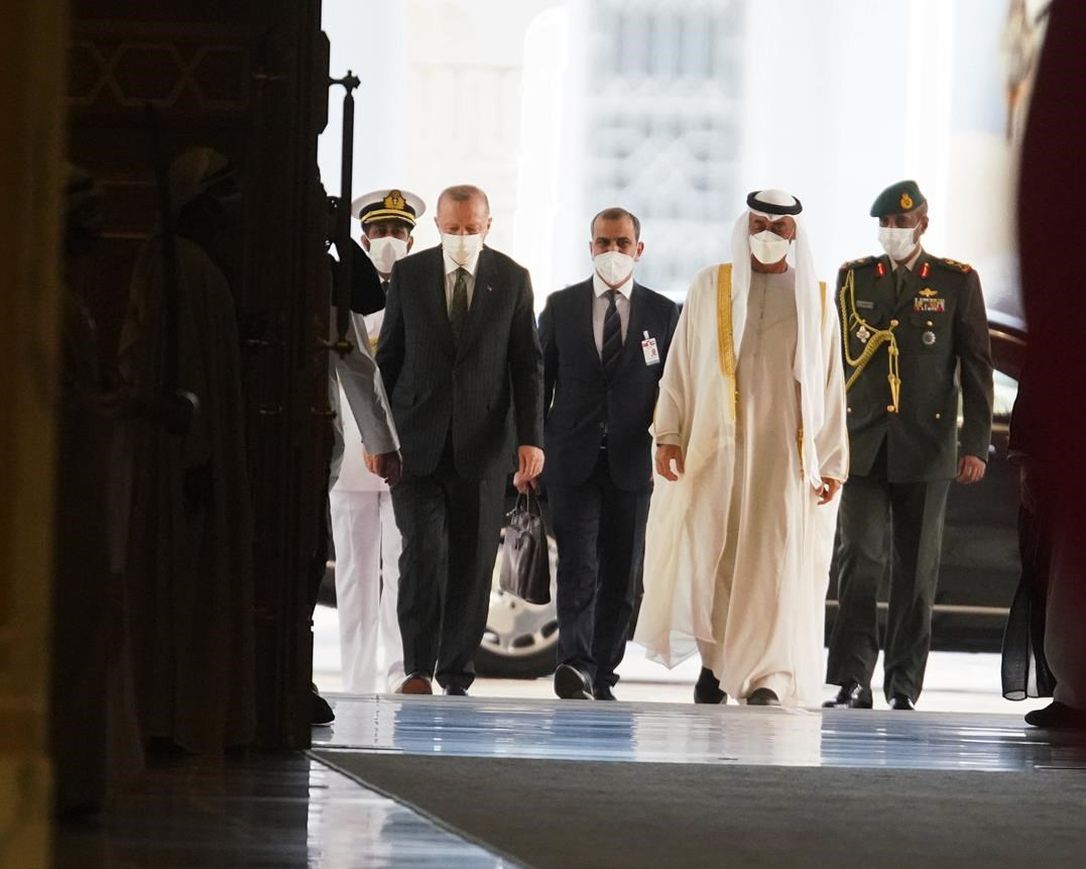Turkish President Recep Tayyip Erdoğan on Monday arrived in the United Arab Emirates (UAE), his first visit to the Gulf nation in nearly a decade.
His visit arrives amid efforts that began last year to thaw ties between the regional rivals, whose relations have been severed by a number of diverging foreign policies, including but not limited to Syria, Libya, and the Mediterranean.
Very few people saw the rapprochement between Turkey and the UAE coming, CNN said on Monday, when Erdoğan and Abu Dhabi Crown Prince Sheikh Mohammed bin Zayed signed 13 cooperation agreements in sectors including defence and trade.
CNN recaps the last decade in Turkey-UAE relations and sheds light on the latest developments in their burgeoning relationship:
The speed of the shifts in the Middle East’s geopolitical scene is enough to give even the most seasoned regional observers whiplash
Longtime foes Iran and Saudi Arabia are talking, the UAE is trying to mend ties with Iran, and Qatar was welcomed back into the Gulf Cooperation Council after an unprecedented rupture in relations. A thaw in Turkish-Egyptian relations is also on the horizon and Turkish-Israeli reconciliation is in the works.
But perhaps the most stunning rapprochement has been between the UAE and Turkey — few saw that one coming. The two were pitted against each other in almost every regional conflict for the better part of the past decade and found themselves on opposite ends of the ideological spectrum.
In the latest sign of reconciliation, Turkish President Recep Tayyip Erdogan arrived in Abu Dhabi on Monday to meet with the crown prince of Abu Dhabi and the UAE’s de facto ruler Sheikh Mohammed bin Zayed (known as MBZ) and sign new agreements. It was Erdogan’s first official visit to the UAE since 2013.
“The reconciliation I saw [as] least likely… [with] the most problems [and] divergent interests, was that of the UAE and Turkey,” Turkish foreign policy expert Yusuf Erim told CNN.
The rift emerged after Turkey publicly supported the Arab Spring protests that unseated some Arab governments and threatened others in 2011. Erdogan was one of the staunchest backers of Muslim Brotherhood-affiliated groups that played a significant role in some of those protests. That was a red line for Arab monarchies, including the UAE, which viewed those movements as an existential threat.
For Turkey, the turning point with the UAE came in 2016, after Erdogan survived an attempted coup that Turkish officials accused the UAE of backing. The following year, when Qatar’s neighbors, including the UAE, boycotted the country for its alleged ties to Islamists, Turkey lent its support, further aggravating Abu Dhabi.
The regional powers faced off in a dangerous rivalry driven by their expansionist foreign policy that stretched from the Eastern Mediterranean to the Persian Gulf and East Africa. But nowhere did it unfold as perilously as in Libya, where they engaged in a devastating proxy war from 2019.
Signs of a détente finally began to appear last summer, first with a surprise visit to Ankara by the UAE’s national security adviser, then with a call between Erdogan and MBZ.
The call marked “a new phase … in which the UAE seeks to build bridges … to ensure future decades of regional stability” said Anwar Gargash, diplomatic adviser to the UAE president. Local media has referred to the relationship as a “strategic partnership.”
Then, in November, Sheikh Mohammed arrived in Ankara for his first visit in a decade, welcomed with fanfare and a flag-waving cavalry. It had become clear by then that the status quo was unsustainable, especially at a time of perceived American disengagement from the Middle East, which risks leaving many of America’s allies with no option but to fend for themselves.
There was a clear shared desire to recalibrate both their foreign policies in a way that would benefit their respective economies. The two were perfectly positioned to shift to a more conciliatory approach.
Faced with a coronavirus-related downturn, increased economic competition from neighboring Saudi Arabia and the growing cost of military engagements in the region, the UAE declared last summer that it was adopting a foreign policy U-turn. While it said that its external relations would now be determined by economic interests, the departure of President Donlad Trump and a desire to play a greater diplomatic role in the region was also a factor in the policy shift.
At the same time, Turkey’s economy was tanking. Annual inflation reached near 50% and by the end of last year, with its currency losing half its value against the dollar. Ankara could no longer afford to alienate rich Gulf states.
Erdogan’s rise to power in 2002 has been be attributed to the economy — he doesn’t want it to now become the cause of his downfall. The president has promised to turn the economy around, knowing that failure to do so would have him pay dearly at the polls next year. He’s banking on the UAE and other Gulf Arab states to inject billions into Turkey.
“The economy is very, very important for the Turkish president,” Erim said. “A weaker economy before 2023 elections is definitely something he doesn’t want, and the Emiratis have the money to be able to provide a booster shot for the Turkish economy.”
The money has already started flowing: the UAE has announced a $10 billion Turkey investment fund and a nearly $5 billion currency swap to boost its foreign exchange reserves. Better relations will also mean a return of Gulf Arab tourists next summer, bringing in much-needed hard currency.
The economy may be a key driver for Erdogan. But this burgeoning relationship is part of the wider jigsaw of realignment being witnessed in an ever-changing Middle East.
By Jomana Karadsheh
Source: CNN 


